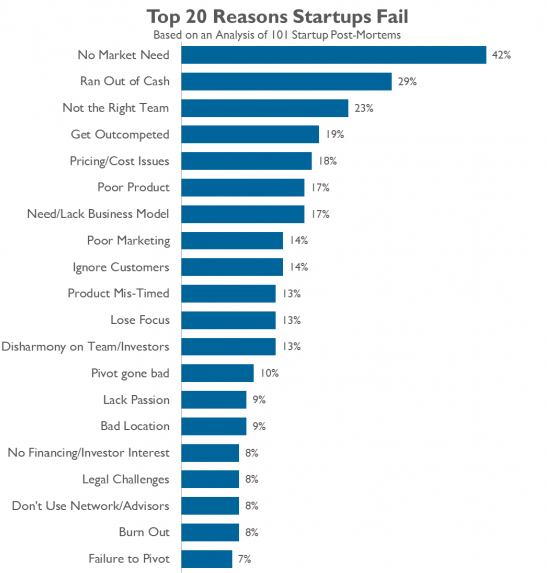Validating Startup Idea -Why & How?
Before going into why and how to validate startup idea, it is pertinent to note these stats about startups.
Ten interesting stats about startups
- Worldwide there are about 300 million entrepreneurs.
- 50 million businesses are launched every year, that’s about 137,000 per day.
- Firm birth and death rates are nearly equal, so about 120,000 probably shut down each day,
- In the US, $1,532 in venture capital is invested every second – that’s $48.3bn per year.
- Hootsuite, 9GAG, Airbnb and Eventbrite are among top 5 startups.
- US, India, Indonesia, UK and Brazil are top five startup countries.
- At over 4200 startups, India ranks third globally in the number of startups (2015).
- The total funding in India-based startups is nearly $5 billion (2015).
- India is the world’s youngest start-up nation with 72% founders less than 35 years.
- 90% of startups fail.
Why validate startup idea
Almost one in two startups that fail do so mainly because they create products that no one wants to use. In a post-mortem analysis report cited on Fortune, ‘no market need’ topped the top 20 reasons for startup failure.

With barriers to entry being low in technology startups (compared to other industries), going startup seems like an easy thing to do. Successful startups inspire entrepreneurs and they feel encouraged to pursue their idea, in the hope that they would also be just as successful.
You experience a Eureka moment when an idea is born in your mind. The immediate reaction is almost always:
This could be the next big thing…
This can be a game-changer…
This can change the way the world does this task…
Next, you relate the idea to your near and dear ones and they almost always say, “Wow, that’s a great idea. Congratulations! You should go ahead with it.”
You are too much in love with the idea to analyse its demerits, just as someone who is in love with someone is. Or even worse than that. If you don’t validate startup idea, it’s like meeting someone on Monday, falling in love instantly and getting married on the weekend.
Those around you may not caution you, because, conversations are generally about saying what people LIKE to hear than saying what they NEED to hear. People are eager to fawn you or afraid of disagreeing with you, so they may not point out even if they see some drawbacks in it.
Because you did not validate startup idea, you create a product, but don’t find enough takers for it. A lot of your time and funds are wasted in chasing an idea that was never meant to succeed. You are left with a failed startup and your investors are left with broken promises.
How to validate startup idea
1. Validate startup idea by hating it
When you get an idea, instead of falling in love with it instantly, hate it. Ask yourself, “WTF? Are you out of your senses?” And then answer yourself as to why you think the idea will work or not work. Be a devil’s advocate for your own idea and have a long internal debate with yourself – one side of you opposing the idea and citing reasons for the same, and the other side defending the idea with valid reasons and accepting the criticism where applicable.
2. Validate startup idea by encourage people to criticize it
I remember in a James Hadley Chase novel I’d read many years back. The man chalks out a detailed plan to murder his wife that includes a perfect alibi for himself and his accomplice. He then presents the plan to his accomplice (his wife’s secretary) and says categorically,
“Go ahead and pick holes in it.”
And sure, the accomplice points out the loopholes in the plan and the two revise it to plug them.
So why did the murderer not look for “yes men” when he presented his idea and rather encouraged criticism? He did, because he wanted a fail-proof plan. He could not afford to fail, because failing meant going to jail. A critical evaluation of the plan was what would help him succeed at the plan than instant applause from juniors. (On a side note, the alibi did not work, and the police found out, because crime never pays!)
The lesson to be learnt here is to encourage people to criticize your idea than expect them to instantly gasp in admiration.
Present it to your worst critics than to your yes men, and make note of their feedback. Your worst critics are usually your well wishers! In my case my son is my worst critic. “Mama, you look awful in this dress.” “This hair style does not suit you.” “This color is yucky.” It turns out that the chap is almost always right.
But not all your critics may be your friends. Some of them could be “frenemies” or outright enemies and they have an axe to grind on you. You need to weigh in all the factors while assessing the feedback.
3. Don’t tell them it’s your startup idea
If you want honest opinion, you can also tell your friends or family that you’re surveying on behalf of an acquaintance, and ask their advice whether you should become a partner in it. They are more likely to point out the negative aspects of the idea (if any)and advice you not to join it.
4. Survey potential customers to validate startup idea
Google forms are a handy tool! The questions you include in the survey are key to success as also how you frame them. Include questions around the problems they are facing, how they are currently solving those problems, would they like the kind of solution that you are developing, why would they use or not use it, what features would they like in it, how much would they be willing to pay for it, etc.
The problem with such surveys is that people are likely to give you positive feedback, because they don’t want to be rude to you. In any case they are only responding to a survey and not actually buying your product, so it doesn’t hurt them to say what you want to hear.
To get around this, ask the question multiple times in different ways and trick them into giving honest opinion.
Use information from the survey to adopt a lean strategy and include only those features in your minimum viable product (MVP) or the prototype.
5. Casually talk to potential customers to validate startup idea
Don’t tell them you are surveying. Just chat informally, casually bring up the subject and kick the idea around. Tell them somebody is working on an idea that addresses their troubles and laugh at it like it’s a crazy joke. Say how stupid the idea is and see what they say.
6. Validate startup idea with various tools
Some startups are creating landing pages or using heatmap tools to test their idea and check user reaction.
7. Validate startup idea against what’s already there in the market
I remember, the toughest part of doing my PhD was choosing a topic for the dissertation. When I did choose one, as per the research conventions, I had to check what work has already been done in the area, and what new findings I can put forth in my thesis. In fact, we have to include a section in our dissertation about the research already available on the topic, even before we go about making our own proposition.
The same convention should apply to startups. You need to check your offering in comparison to the solutions already available in the market and make a case as to how your product will render the others obsolete.
8. Conduct mock-up trials
This may not be possible for all, but for some ideas. If you can manually deliver what your product automates, then try that with a few potential customers and see how it goes, how they receive it, and how they react to it.
Validate startup idea by dating it
The long and short of it is, date the idea for some time before you decide to “tie the knot” with it. Subject it to the highest levels of scrutiny and hatred and get feedback from various people including potential customers. Assess the feedback objectively before you go about developing the product.
Feedback and criticism not only prevents you from pursuing an idea that would turn out to be a non-starter, but it will also help you buttress your plan, so you design a product that is more likely to be successful commercially.
A startup may fail due to other reasons too – such as poor marketing, a poor team, poor customer service, or lack of funds. But at least, you can rule out the top reason for startup failure – no market need.




